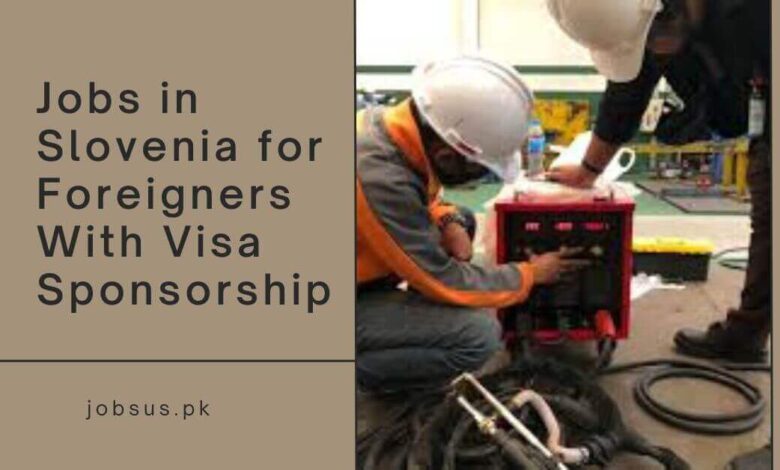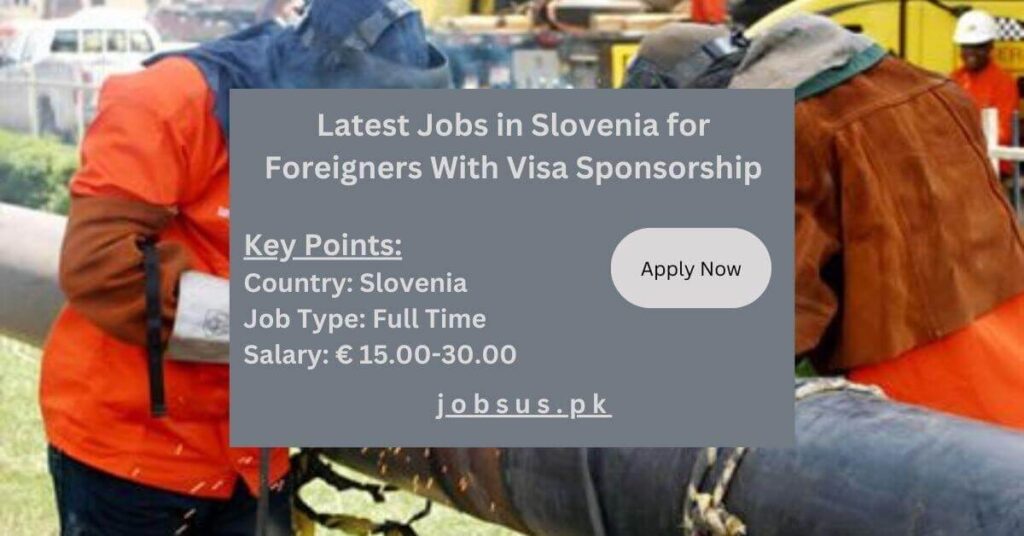Jobs in Slovenia for Foreigners With Visa Sponsorship 2025

the state of Florida provides a diverse array of H-1B visa sponsorship opportunities spanning various industries. The H-1B visa program permits employers in the United States to engage foreign professionals in specialized sectors, including technology, healthcare, finance, and education.
Check Also: Visa Sponsorship Jobs in Europe – Work Visa

Slovenian Work Visa Categories:
Various visas are issued by the Slovenian government to foreign visitors in accordance with the intent of their trip. Slovenian visas are offered in the subsequent varieties:
- Visas are mandatory for business-related activities.
- Visas granted for medical purposes.
- Visas for members of the official delegation.
- Visas for voyaging
- Visas are issued for the purposes of training, research, and academic endeavors.
- Visas for airport transit purposes.
- Spousal visas for citizens of Slovenia.
While these visas permit foreign nationals to enter Slovenia, they do not confer the right to an indefinite stay or authorization for employment within the country. Foreign nationals are required to secure a Single Work and Residence Permit to proceed with this endeavor.
Benefits:
- International Experience: Employment opportunities that offer visa sponsorship enable individuals to live and work in a foreign country, thereby gaining valuable international experience. This exposure has the potential to expand an individual’s perspectives, enhance linguistic proficiency, and deepen cultural awareness.
- Career Development: Securing employment in Slovenia through visa sponsorship can enhance opportunities for professional advancement. Employees may be granted the opportunity to cultivate their professional networks, engage with a diverse array of initiatives, and acquire new skills—each of which can significantly enhance their career advancement.
- Cultural Exchange: Visa sponsorship positions facilitate employees’ engagement with Slovenian communities, clients, and colleagues, thereby fostering cultural exchange. Participating in this cross-cultural experience may lead to an enhanced understanding of various communication conventions, operational methodologies, and cultural nuances.
- Language Acquisition: Opportunities may be available for individuals relocating to Slovenia to acquire or improve their proficiency in the Slovenian language. Cultivating this linguistic proficiency can serve as a significant advantage in both personal and professional domains.
- Global Networking: The sponsorship of visas often requires collaboration with individuals from diverse nations. This represents a significant opportunity to cultivate a global professional network, which may yield advantages regarding future employment opportunities.
- Diverse Work Environments: Slovenia, akin to many European countries, features a vibrant and multifaceted work environment. Personnel sponsored by visas may be granted the opportunity to acquire practical experience across diverse sectors, industries, and roles, thereby augmenting their professional versatility.
- Advantage of Membership in the European Union (EU): As a member state of the EU, Slovenia provides its workforce with the opportunity to acquire experience and establish connections within the broader European labor market. This may present additional opportunities for professional advancement within the European Union.
- Quality of Life: Slovenia is distinguished by its robust sense of community, breathtaking landscapes, and exceptional quality of life. Prospective employees who opt to migrate to Slovenia may find a more relaxed ambiance, outstanding healthcare services, and a generally advantageous living environment.
- Opportunities for Advanced Study: Certain visa sponsorship programs may provide avenues for professional advancement or continued education. Employers may offer support to employees in their endeavors to pursue advanced education or engage in training programs.
- Pathway to Permanent Residency: The attainment of permanent residency or citizenship may be facilitated through employment that offers visa sponsorship in Slovenia, subject to the visa category and the individual circumstances of the applicant. This may enhance the nation’s long-term stability and cultivate a sense of national identity.
List:
Foreigners seeking visa-sponsored employment in Slovenia are listed below:
1. Accounts Payable Clerk
Duties & Responsibilities:
- Invoice Processing: Oversee a significant volume of invoices while ensuring strict compliance with organizational policies and maintaining a high level of accuracy.
- Vendor relations involve engaging with suppliers to address issues and sustain a robust relationship.
- Expense Reconciliation: Monitor expenditures and conduct account reconciliations to ensure the accuracy of financial records.
- Data Entry: Precisely input financial information into systems while ensuring that records remain current and systematically organized.
- Furnish precise financial data to facilitate the month-end closing procedure and guarantee its seamless execution.
- Cross-functional collaboration encompasses the capacity to address inquiries and facilitate the seamless functioning of the organization in conjunction with various departments.
2. Machine Operator
Duties & Responsibilities:
- Make the necessary adjustments to the machine while diligently overseeing the quality of the manufactured product and addressing any material concerns through the implementation of continuous machine inspections.
- As necessary, either obtain or create software programs that facilitate the correct operation of the machine and its configuration tailored to specific tasks.
- Set up and operate machinery utilizing the requisite consumables and tools to fulfill the specifications of the current undertaking.
- It is imperative to uphold optimal material utilization and accurate material reporting to enhance the quality of finished products while concurrently reducing the consumption of basic materials.
- By employing cranes, forklifts, and various hoisting equipment, components and materials can be transported to their designated locations.
- Perform measurements employing precision instruments, including micrometers, calipers, and tape measures.
- Prior to, during, and subsequent to the production process, initial piece inspections and supplementary quality assessments are conducted to ascertain that the material and/or product complies with the stipulated specifications.
- Performs additional responsibilities relevant to the position as directed by management.
Work Visa Requirements in Slovenia:
Non-citizens of the European Union (EU) or European Economic Area (EEA) are required to possess a Single Work and Residence visa in order to work in Slovenia. Occasionally, this authorization is described as a “single permission.” In order to acquire this permit, candidates are required to provide the following documentation:
- A current passport.
- Upon submission of the application, a passport photograph and biometric data will be collected.
- Authorization of the applicant’s Slovenian health insurance coverage.
- A recent investigation into the applicant’s criminal record was conducted in their country of origin.
- A bank statement from the applicant demonstrating the availability of adequate financial resources to sustain oneself in Slovenia.
Exceptions may arise in which the applicant is required to appear at the embassy of their native country for an interview with Slovenian officials.
Important Considerations:
CCitizens of other European Union member states who wish to seek employment in Slovenia are exempt from the regulations pertaining to the necessity of obtaining a work permit, owing to Slovenia’s membership in the European Union (EU). Nationals of the European Union intending to reside in Slovenia for a period exceeding three months are still obligated to submit an application for a residence visa.
How does a foreigner find work in Slovenia?
EU residents who are not Slovenian nationals but are pursuing work experience are exempt from obtaining a work permit. Non-EU nationals, on the other hand, are prohibited from working in Slovenia unless they possess a residence permit and a work visa, both of which must be applied for in advance.
You may also conduct job searches on the subsequent websites:
What jobs are available in Slovenia?
Slovenia is currently experiencing a significant deficit of qualified educators, medical professionals, and various other healthcare specialists. In Slovenia, there exists a substantial demand for a diverse array of products. A research initiative referred to as the Professional Barometer forecasts the prospective levels of supply and demand within the labor market. It is anticipated that as many as 108 distinct professions will encounter shortages in personnel.
Slovenian living costs:
Despite being the most expensive nation in the former Yugoslavia, Slovenia remains affordable for those willing to make certain compromises in order to fulfill their financial responsibilities. Food expenses are similar in nature to those observed in Europe, where a loaf of bread costs approximately €1.17 and a liter of milk costs around €0.84, respectively.
Furthermore, transportation costs are comparable to those incurred in Europe. A taxi will charge you €1.20 for the initial kilometer and €1 for each additional kilometer, whereas one liter of gasoline will cost approximately €1.25 per liter.
Average Salary in Slovenia:
The annual remuneration in Slovenia rose from the preceding year’s average of 27,609 euros to 27,980 euros. Although incomes in Slovenia reached their zenith in 2013, they had previously attained their highest levels since 2001, a time characterized by the lowest annual wages.
The processes of overcoming melancholy and acclimating to a new environment necessitate a considerable amount of time for individuals who are employed and residing in a foreign country. Adapting to life in Slovenia and establishing a sense of belonging may prove to be less challenging than you expect, as Slovenians are generally welcoming and accommodating towards immigrants, both personally and professionally. This location presents an exceptional opportunity to acquire experience in both professional and residential contexts abroad, owing to its reasonable cost of living, the plethora of employment prospects available for foreign nationals, and the substantial expatriate community.
Frequently Asked Questions:
What jobs are shortage in Slovenia?
Other occupations with shortages include health associate professionals [48]; cooks; waiters, butchers [49]; toolmakers; bricklayers; welders [50]; machine technicians; locksmiths; metal workers.
What is the minimum salary in Slovenia?
The minimum wage for employees in Slovenia is typically 7.84 EUR per hour, amounting to ~1,253.90 EUR per month for a typical 40 hour work week
What is the notice period in Slovenia?
15 days for employees with less than one year of service; 30 days for employees with more than one year of service; and. for employees with two or more years of service, the 30-day notice period increases for two days for each year of employment with the employer but cannot exceed 60 days.



